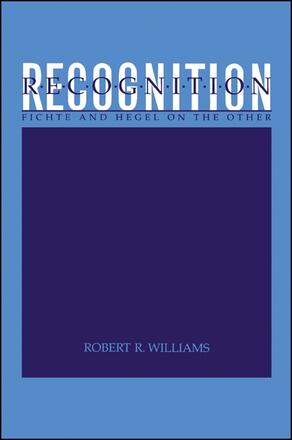Preface
Abbreviations
Part One: Introduction
1. Introduction
The Hidden Theme of Intersubjectivity in German Idealism
Phenomenology and German Idealism
Phenomenology in German Idealism
The Problem of the Other in Contemporary Philosophy
Plan and Overview
Part Two: Fichte
2. Between Kant and Fichte
The Problematic Transcendental in Kant
Reaction to Kant: Reinhold's Quest for Certainty
Fichte and The Crisis in First Principles
First Introduction to Wissenschaftslehre
Fichte's Antifoundationalism
From Transcendental Philosophy to the Pragmatic History of Spirit
Fichte's Foundationalism?
3. Fichte on Recognition
The Status and 'Location' of the Problem of the Other
The Naturrecht in the Development of Fichte's Thought
The Concept of Right
Freedom as Intersubjective
The Other as a Summons (Aufforderung) to Freedom
Aufforderung and the Anstoß
The Ambiguity: Aufforderung as Transcendental Fact
Recognition (Anerkennung)
Critical Evaluation
Part Three: Hegel
4. The Early Hegel and Fichte
Hegel's Earliest Social Theory
Heteronomy and Domination in Hegel's Early Theological Writings
Love and Reconciliation in the Early Theological Writings
Hegel's Theory of Love
Love as Intersubjective
The Limits and Fate of Love
Hegel's Critique of Fichte
Problems in Appropriating Anerkennung
Transformation of Anerkennung
Love and Anerkennung
Anerkennung in the Mode of Conflict
Conclusion
5. Hegel and Phenomenology
Husserl
The Phenomenological Reduction or Epoché
The Theoretical Inversion of the World of the Natural Attitude
Reduction as Reversal of the Positivist Reversal
The Abyss of Groundlessness: Philosophy without Foundations
Hegel and Husserl?
Hegel's Treatment of Skepticism
Turning the Tables
Alterity and Truth
6. Hegelian Phenomenology
The Task of the Phenomenology of Spirit
Hegel's Hermeneutical Critique of Critique
The Problem of the Criterion
Intentional Analysis of the Gestalts of Consciousness
Consciousness Tests Itself
Self-Accomplishing Skepticism: The Highway of Despair
Between Panlogism and Existential Anthropology
7. Hegel's Eidetics of Intersubjectivity
Life as a Category
Towards an Eidetics of Recognition
Overview of Hegel's Eidetics
Hegel's Eidetics: Translation and Commentary
Hegel §1
Commentary: The Doubling of Self-Consciousness
Recognition and the Problem of Relation
Hegel §§23
Commentary: Othering and the Other
Hegel §4
Commentary: The Sublation of Otherness and the Other
Hegel §§56
Commentary: Reciprocal Recognition
Hegel §7
Commentary: The Interplay of Intersubjectivity
Summary
8. The Empirics of Recognition
Towards the Life and Death Struggle
Phenomenology of Mastery
Phenomenology of Servitude
Summary
Love as a Form of Recognition
9. Recognition and Geist
The Social Dimension of Recognition
Two Levels of Recognition
Hegel's Departure from Transcendental Philosophy
The Social Context and Mediation of Reason
Spirit and the World
Recognition in its Tragic Realization
Tragic Recognition: Antigone
Tragedy in Estranged Spirit
Beyond Tragedy: Conscience and Forgiveness
10. Absolute Spirit, Recognition, and Tragedy
Anomalies in Hegel's Treatment of Religion in the Phenomenology
An Intersubjective-Social Conception of Religion
Religion as Quest for Recognition
Tragic Recognition
The Religion of Art
Hegel's Changing Assessment of Tragedy
The Revelatory Religion
Absolute Geist and Tragedy
The Death of God: Hegel's Theological Atheism
The Death of God and Tragedy
11. Recognition and Absolute Knowledge
Absolute Knowledge
Two Models
The Problem of Relating the Two Models
From Vorstellung to Begriff
Towards a Non-Foundational Absolute Knowledge
Hegel's Critique of Positivity
The Triadic Structure of Absolute Spirit
Hegel's Triadic Holism: Two Possibilities
Conclusion
12. Hegel and Phenomenology: Husserl, Sartre, and Levinas
Husserl
Sartre
Sartre's Reading of Hegel
Hegel's Breakthrough
Sartre's Criticism of Hegel
Levinas
Levinas and Hegel
Bibliography
Index
